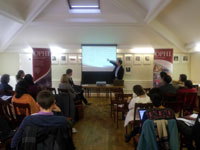Dynamic Comparison between Multidimensional Poverty and Monetary Poverty
This research workshop was held in Oxford by OPHI and Stephan Klasen,  Professor of Development Economics and Empirical Economic Research at the University of Göttingen, Germany.
Professor of Development Economics and Empirical Economic Research at the University of Göttingen, Germany.
The workshop saw 17 papers presented: two of them on multidimensional poverty methods; two on monetary poverty; and 13 in which monetary poverty and multidimensional poverty were compared in different countries, including Bhutan, India, Nepal, Uganda, Vietnam, Peru, Venezuela, Mexico, Indonesia and South Africa. You can download and listen to the presentations given by clicking on the links in the table below.
During the workshop a number of video interviews were recorded in which participants including Stephan Klasen, Sabina Alkire and Frances Stewart shared their thoughts on the key findings. The workshop looked at a number of practical questions:
- When do multidimensional poverty measures add information lacking in monetary poverty measures?
- If the headcounts of income and MPI are similar, are the same people identified as poor by both measures?
- Should a multidimensional poverty measure include income or consumption poverty, or should these be kept separate?
- How do relationships across multidimensional and income poverty measures evolve over time?
In order to catalyse comments and input, four common analyses were presented by the papers which compared monetary and multidimensional poverty:
- Rural-urban
- By quintile
- By household size
- Cross-tabs of multidimensional and monetary poverty with matching headcounts.
Participants of the workshop included Professor Sir Tony Atkinson, OPHI Advisor and Senior Research Fellow at Nuffield College, Oxford University; Francis Stewart, Professor Emeritus of Development Economics at Oxford University's Department for International Development (ODID); Doug Golling, Professor of Development Economics at ODID; and James Foster, OPHI Research Associate and Professor of Economics and International Affairs at The Elliott School of International Affairs at George Washington University in the United States.
-
Presentations and audio
-
Video reflections


